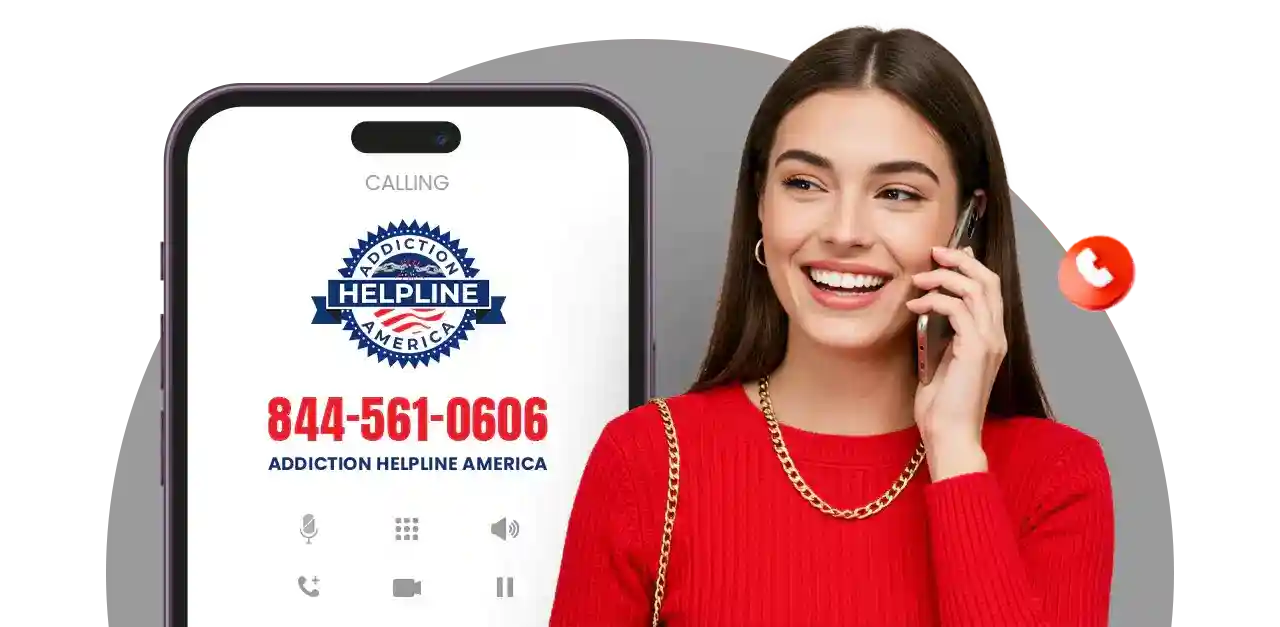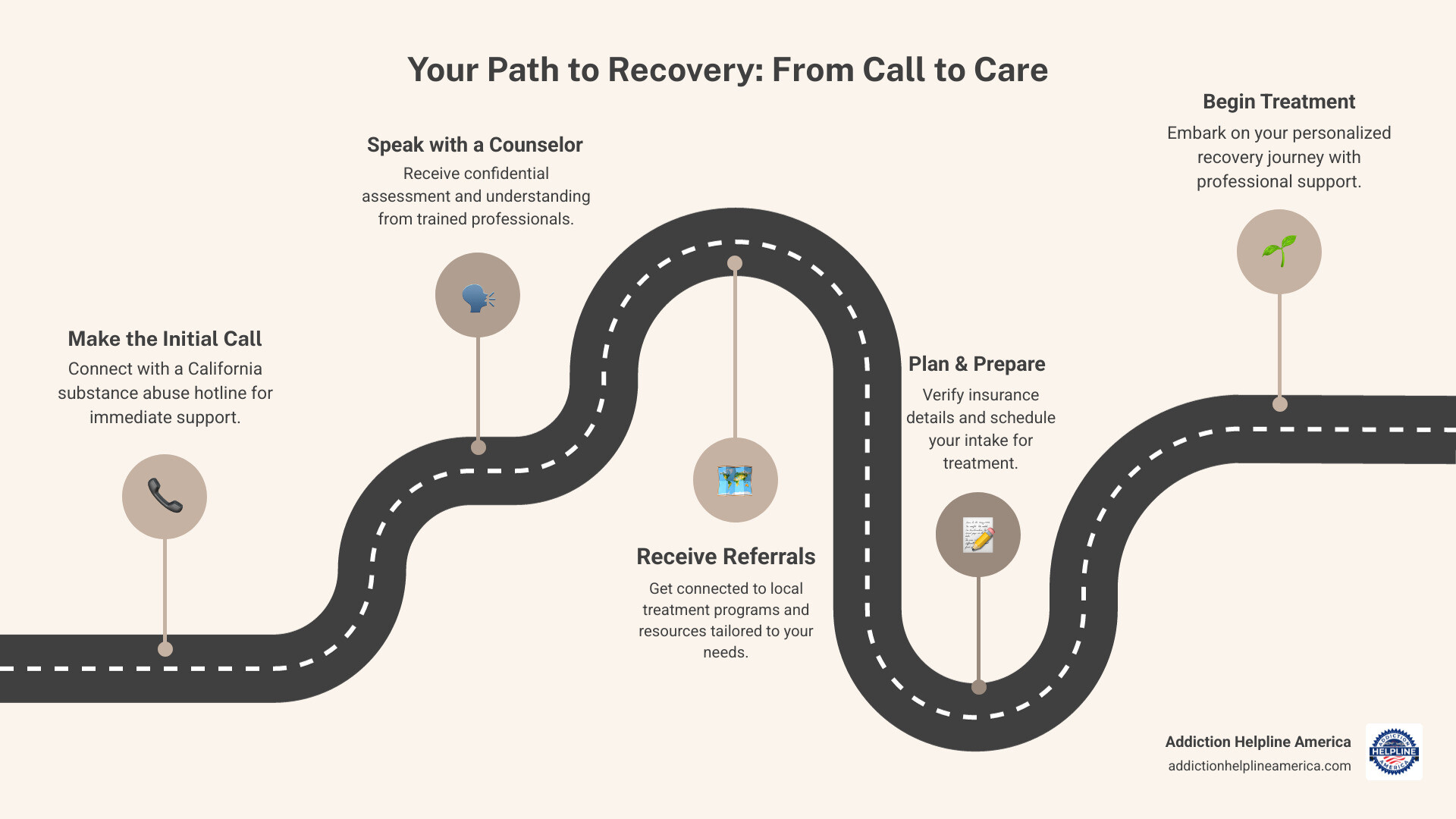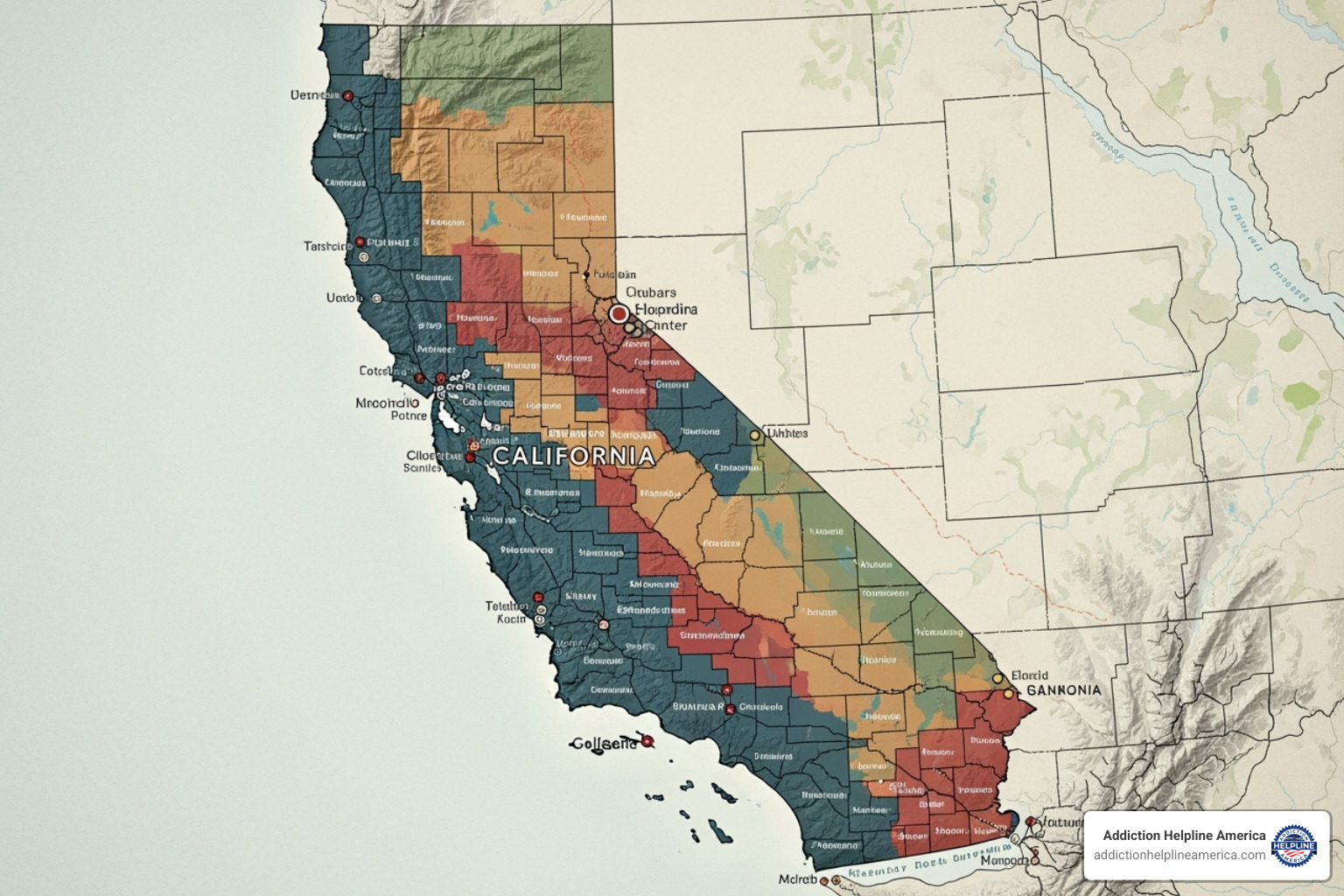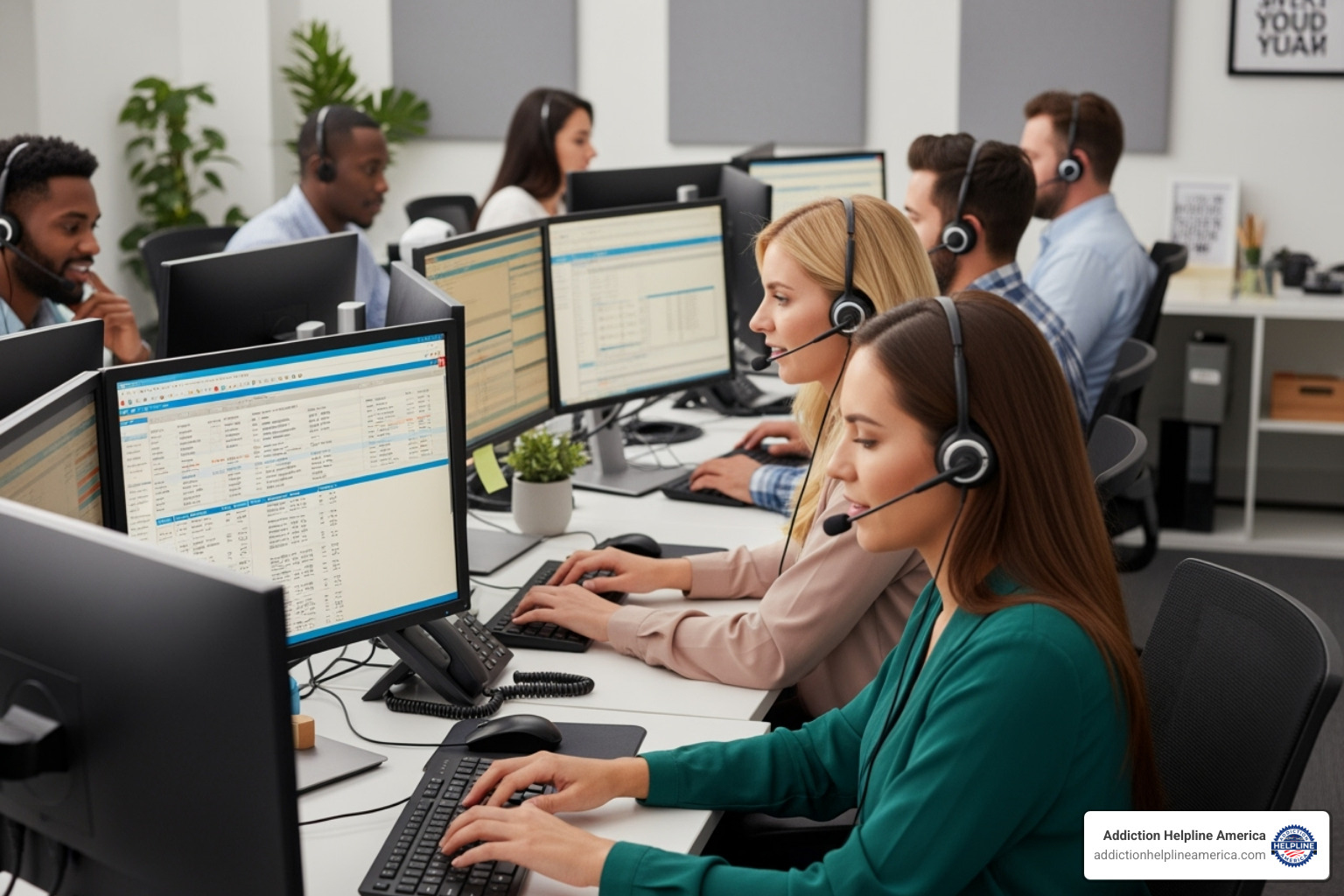
Making the Call That Could Save Your Life
California Substance Abuse & Drug Addiction Hotlines are an immediate connection to help when addiction feels overwhelming. If you or a loved one is struggling, these are the most important numbers to know:
Key California & National Hotlines:
- Addiction Helpline America: 1-866-210-1303 (24/7, free, confidential)
- SAMHSA National Helpline: 1-800-662-HELP (4357)
- 988 Suicide & Crisis Lifeline: 988
- 211 California: Dial 211 or text your zip code to 898211
- Crisis Text Line: Text HOME to 741741
- Emergency Medical Crisis: Call 911
The statistics are stark: 15% of California residents have used illicit drugs in the past month, and in 2021, 10,901 Californians died from overdoses. But addiction is a treatable disease. The hardest part is often making that first call.
You don’t need to have all the answers or be “ready” to quit—you just need to pick up the phone. These 24/7 hotlines are staffed by trained professionals offering confidential support, answers, and connections to local treatment.
At Addiction Helpline America, we’ve helped thousands find the path from crisis to recovery. Through our compassionate hotline services and comprehensive treatment referrals, we serve as a vital connection for those seeking help via California Substance Abuse & Drug Addiction Hotlines. This guide will show you how to prepare for and make the most of your call.
1. Understand the Urgent Need for Help in California
California is facing a devastating substance abuse crisis. The impact ripples through families and communities, creating broken relationships, financial devastation, and unstable homes. This isn’t just a personal struggle; it’s a public health concern affecting everyone.
The good news is that help is available. Substance use disorders affect millions of individuals, and understanding that addiction is a treatable medical condition—not a moral failing—is the first step. The sooner you reach out, the better the chances of recovery.
Why a Hotline is a Critical First Step
Making the first call is often the hardest part, but California Substance Abuse & Drug Addiction Hotlines exist for this exact moment. Think of a hotline as your immediate lifeline. Key benefits include:
- 24/7 Availability: Addiction doesn’t keep business hours. Trained counselors are always available to help, day or night.
- Confidentiality: Calls are private and protected, creating a safe space to speak honestly without fear of judgment. You don’t have to give your name.
- Free Service: Most hotlines are completely free. Cost should not be a barrier to getting help.
- Connection to Help: Counselors provide more than a sympathetic ear. They assess your situation, explain options, and connect you to treatment programs, detox facilities, and other support services.
- Reduced Stigma: Speaking with someone who understands addiction as a disease helps reduce the shame that keeps many people silent. It’s a reminder that you are not alone and deserve help.
That first call might feel impossible, but it could also save your life.
2. Know Who to Call: A Guide to California Substance Abuse & Drug Addiction Hotlines
Knowing which number to dial can feel overwhelming, but there is no wrong call. California has a network of hotlines designed for different needs, from general questions to crisis intervention. Staffed 24/7 by compassionate professionals, these hotlines are always ready to connect you to the resources you need.
General Substance Abuse and State-Specific Hotlines
- Addiction Helpline America: Call 1-866-210-1303 for 24/7, free, and confidential assistance. Our specialists provide personalized guidance and can connect you to our extensive network of treatment options across California. Learn more on our Addiction Helpline America California Hotline page.
- 211 California: Dial 211 or text your zip code to 898211 for free, anonymous help with substance abuse and other health and human services. Visit the 211 CA website for more.
- SAMHSA’s National Helpline: Call 1-800-662-HELP (4357) for a free, confidential, 24/7 treatment referral and information service in English and Spanish. This federal resource provides referrals to local facilities, support groups, and services.
- Substance Abuse Service Helpline (SASH) for LA County: Residents can call 1-844-804-7500 for 24/7 local support. Clinicians connect callers directly to treatment providers and assist with scheduling. Family and friends are also welcome.
Crisis, Suicide, and Emergency Hotlines
- 988 Suicide & Crisis Lifeline: Call or text 988 anytime for free, 24/7 confidential support for anyone in crisis or emotional distress. Specialized support is available for Veterans (press 1), Spanish speakers (press 2), and LGBTQ+ individuals (press 3). Visit the 988 California Suicide and Crisis Hotline for more.
- Crisis Text Line: Text HOME to 741741 to connect with a trained crisis counselor. Support is also available via chat and WhatsApp.
- Poison Control: For suspected poisoning or overdose, call 1-800-222-1222 immediately.
- When to call 911: If you or someone else is experiencing a medical emergency like an overdose, difficulty breathing, or loss of consciousness, call 911 immediately. Hotlines are for support and referrals, not emergency medical care.
Specialized Hotlines for Youth and Families
- Addiction Helpline America’s Family Support Line: Call 1-866-210-1303 to speak with specialists who help families steer addiction. We offer guidance on difficult conversations, setting boundaries, and finding support. Explore our family support resources in California.
- Boys Town Hotline: Call 1-800-448-3000 or text VOICE to 20121 for 24/7 resources for parents and teens on addiction and other issues. Translation and TDD services are available.
- National Runaway Safeline: Call 1-800-RUNAWAY (786-2929) for 24/7 support for runaway and homeless youth and their families.
- Al-Anon and Alateen: Call 800-356-9996 for peer support for families and friends of people with drinking problems. Al-Anon is for adults, and Alateen is for teens.
- Nar-Anon Family Groups: These groups offer a 12-step program for family and friends affected by drug addiction. Find a local meeting to connect with others who share your experience.
Reaching out is a sign of strength. These hotlines exist because recovery is possible, and you don’t have to do it alone.
3. Prepare for the Call to Make It Count
Deciding to call takes courage. A little preparation can reduce anxiety and help you get the most out of the conversation, but remember: you don’t need to have all the answers. Hotline specialists are trained to guide you, even if you’re feeling overwhelmed. This is about being ready to receive help, not being perfect.
Gather Key Information
Having some basic information ready can help the specialist assist you more effectively. Consider the following, but don’t worry if you don’t have all the details:
- Substance Use History: What substances are being used, how often, and for how long?
- Co-occurring Conditions: Mention any mental health conditions like depression, anxiety, or PTSD. Treating addiction and mental health together (dual diagnosis) is often crucial.
- Insurance Information: If you have it, your provider and policy number can help verify coverage. If not, don’t worry—many free and low-cost options exist.
- Treatment History: What has been tried in the past? What worked and what didn’t?
- Current Situation: Are you in a safe place? Are you hoping for information, support, or a direct referral?
For more information on how we connect you with services, visit More info about our services in California.
Write Down Your Questions
Emotions can run high during the call, so writing down questions beforehand can be helpful. This ensures you get the information you need. Consider asking about:
- Treatment Options: What are the differences between inpatient, outpatient, and detox? Is Medication-Assisted Treatment (MAT) an option?
- Costs and Insurance: What are the costs? Are there free, sliding-scale, or insurance-covered options?
- Location and Specialization: Where are the nearest facilities? Are there specialized programs (e.g., for opioids, youth, dual diagnosis, veterans, LGBTQ+)? We can help you Find a treatment center in Los Angeles.
- Next Steps: What is the immediate action plan after the call?
- Helping a Loved One: How can you best support them? Are there family resources or intervention services?
Having questions ready helps you leave the call feeling informed and empowered.
4. Know What to Expect: From a Listening Ear to Treatment Referrals
When you call a hotline, you’ll connect with a trained, non-judgmental professional. While hotlines don’t provide ongoing therapy or medical treatment, they are a crucial gateway to recovery. They are a bridge from where you are to where you need to be, staffed by people who listen, understand, and help you find the next step.
What Help You Can Receive from These Hotlines
During the call, a specialist will provide:
- Confidential Assessment: A brief, conversational assessment to understand your situation.
- Emotional Support: A compassionate, understanding ear when you feel alone or overwhelmed.
- Addiction Information: Clear explanations about the disease of addiction and what recovery entails.
- Referrals to Local Resources: This is a key function. Specialists use a database to find treatment facilities, support groups, and services across California. They can connect you with programs like Addiction Helpline America – Synergy Recovery Services Bakersfield CA that fit your specific needs.
- Guidance on Next Steps: They will help you create a clear plan, which might include scheduling an assessment or making the first call to a treatment center.
Connecting to Treatment Programs
A specialist will explain various treatment options, as recovery is not one-size-fits-all. These may include:
- Levels of Care: Options range from inpatient treatment (24/7 care) to outpatient treatment (living at home while attending sessions) and intensive outpatient programs (IOPs).
- Detox: For many, the first step is medically supervised detoxification to safely manage withdrawal. Facilities like Addiction Helpline America – Mariposa Detox Los Angeles California specialize in this process.
- Medication-Assisted Treatment (MAT): For opioid or alcohol addiction, MAT combines medications with counseling. Our specialists can help you find medication-assisted treatment (MAT) in California.
- Navigating Insurance: Specialists can verify your insurance coverage and connect you to in-network facilities or inform you about state-funded and sliding-scale options if you’re uninsured.
These hotlines are your starting point. They are the hand reaching out to guide you forward.
5. Look Beyond the Call: Your Next Steps to Recovery
Making the first call to a hotline is a powerful first step, but recovery is a journey. Long-term wellness requires building a strong support system of peers, professionals, and community resources. The hotline call lays the foundation; these next steps help build the structure for lasting recovery.
Finding Peer Support Groups
Peer support groups provide a unique form of healing by connecting you with people who understand the recovery journey.
- For Individuals in Recovery: Well-established groups include Alcoholics Anonymous (AA) (hotline: 1-800-839-1686), Narcotics Anonymous (NA), and SMART Recovery, a science-based alternative to 12-step programs.
- For Families and Friends: Support is crucial for loved ones as well. Groups like Al-Anon, Alateen (for teens), NAR-Anon, and SMART Recovery Family & Friends offer dedicated resources.
Finding the right group can be overwhelming. Explore our support resources in California to connect with a community that fits your needs.
Exploring Additional Resources and Treatment Finders
Beyond meetings, several tools can help you find the right support.
- Addiction Helpline America Treatment Finder: Our comprehensive online tool helps you search our network of California facilities by location, treatment type, insurance, and more. Use our California Treatment Finder to connect with quality care.
- Choose Change California: This is a valuable resource for information on opioid use and treatment options, with a searchable database. Visit Choose Change California to learn more.
Recovery is not a one-size-fits-all process. Having access to multiple resources allows you to find the approach that works for you and adapt as your needs change. The hotline call is the first step; these tools help you continue the journey.
Frequently Asked Questions about California Addiction Hotlines
Here are answers to common questions about California Substance Abuse & Drug Addiction Hotlines to help you feel more prepared to call.
Are calls to California substance abuse & drug addiction hotlines free and confidential?
Yes, most calls to these hotlines are completely free and confidential. These services are designed to remove barriers like cost and privacy concerns. Your call is protected by strict privacy guidelines, including HIPAA protections, similar to a doctor’s office. You can remain anonymous, creating a safe space to speak honestly without fear of judgment.
What is the difference between calling a hotline and calling 911?
This is a critical distinction.
- Call 911 for a medical emergency. This includes an overdose in progress, loss of consciousness, difficulty breathing, or any other life-threatening situation. Emergency responders provide immediate medical intervention.
- Call a hotline for support, information, and treatment guidance in non-emergency situations. Counselors can provide emotional support, answer questions, and connect you to treatment resources.
If you are ever in doubt about a medical situation, call 911.
Can my family call a hotline on my behalf?
Absolutely, yes. Family and friends are strongly encouraged to call. Addiction affects everyone, and you deserve support too. Hotline specialists can help families by:
- Providing Advice: Get guidance on how to approach a loved one, understand warning signs, and steer difficult conversations.
- Offering Support Resources: Learn how to support your loved one without enabling them. Specialists can connect you to groups like Al-Anon and Nar-Anon that help you set healthy boundaries and care for your own well-being.
- Sharing Intervention Information: If you believe a formal intervention is needed, hotlines can provide information on professional interventionists and how to organize one.
You can call anytime to get support for yourself and learn how to help. Addiction Helpline America is here to support the entire family.
Conclusion
If you’re reading this, you’ve already taken a courageous step by seeking information. This guide has covered five essential ways to make the most of a call to California Substance Abuse & Drug Addiction Hotlines, from preparing for the call to finding support afterward.
While the statistics on substance abuse in California are daunting, addiction is a treatable disease. The path forward starts with a single phone call. You don’t have to steer this journey alone. The hotlines we’ve discussed are lifelines staffed by people who want to help.
At Addiction Helpline America, our mission is to connect people to the right care. We offer free, confidential, 24/7 support and can help you find treatment options from our extensive network across California. The weight of addiction can feel impossible, but recovery is about taking one small step at a time.
Help is waiting, hope is real, and your story can begin again.
To explore more resources and learn about the support available to you, visit our page to learn more about addiction and rehab hotlines.
Our helpline is 100%
free & confidential
If you or someone you care about is struggling with drug or alcohol addiction, we can help you explore your recovery options. Don’t face this challenge alone—seek support from us.
Programs
Resources
Will my insurance
cover addiction
treatment?
We're ready to help
Find the best
drug or alcohol treatment
center
Are you or a loved one struggling with addiction? Call today to speak to a treatment expert.

















